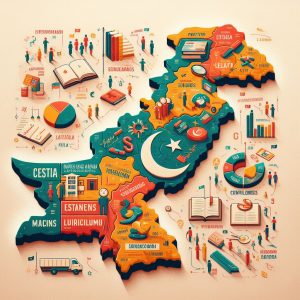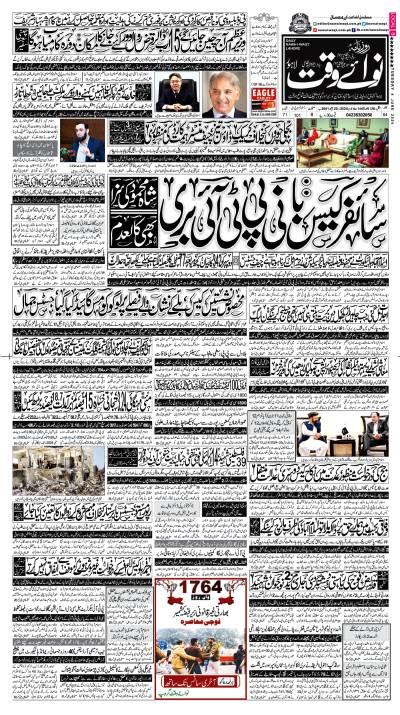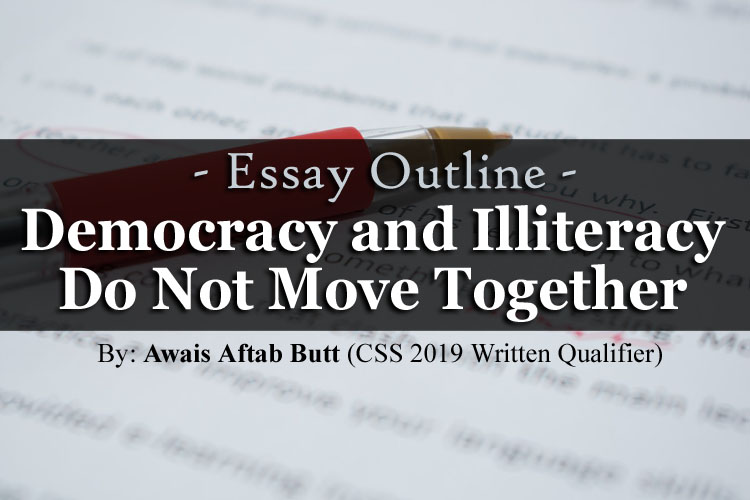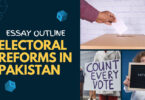

Democracy and Illiteracy Don’t Move Together
- Essays, Outlines
- Oct 21, 2022
- Noshin Bashir

Table of Contents
1. Introduction
Democracy and illiteracy are two concepts that have a complex relationship, and it can be argued that they don’t inevitably move together. Democracy is a political system that promotes the participation of citizens in decision-making, whilst illiteracy refers to the inability to read and write. Along with peace, hunger and disease, illiteracy is another a deep-rooted problem which remains a long way from being solved despite huge investments from government. Illiteracy has another contradictory point concerning to democracy which is its tendency to promote centralized control of power & authority. Illiteracy elicits & supports class disparities by holding the power & authority confined to a few hands only – and this thing kills the spirit of democracy.
2. Challenges of Illiteracy in Democracy:
Illiteracy can pose challenges to democracy as it may limit the ability of people to fully participate in the democratic process. In a democratic society, citizens are probable to engage in critical thinking, make informed decisions, and participate in discussions and debates. However, illiteracy can inhibit these abilities, as it can limit access to information, restrict the understanding of complex issues, and hinder effective communication. Illiterate citizens may confront troubles in understanding political candidates, evaluating policies, or engaging in debates, which can result in reduced participation in elections or decision-making processes. Before moving forward, let’s find out the various forms of democracy and illiteracy:
3. Various Forms of Democracy
- Direct democracy: Direct democracy is a system in which citizens directly participate in decision-making and policy formation without elected representatives, allowing for direct and immediate influence over laws and policies.
- Representative democracy: Representative democracy is a system in which citizens elect representatives to make decisions and enact policies on their behalf, based on the principle of indirect participation.
- Constitutional democracy: Constitutional democracy is a system of government in which the powers of the government are defined, limited, and regulated by a constitution, with an emphasis on protecting individual rights and upholding the rule of law.
- Monitory democracy: Monitory democracy is a concept that refers to a form of democracy in which non-elected institutions or organizations, such as civil society groups, media, and watchdog organizations, play a significant role in monitoring and holding the government and elected officials accountable for their actions and decisions.
4. Basic Types of Illiteracy
- Functional illiteracy: Incompetence in such basic functions as reading, writing, and mathematics.
- Cultural illiteracy: Lack of basic information needed to thrive in the modern world.
- Moral illiteracy: Absence of moral and religious values from educational institutions.
- Healthcare illiteracy: Inability to comprehend and use necessary medical information.
Now we understand the basic types of democracy and illiteracy, now deep down the challenges of illiteracy in democracy.
5. Facts That Prove That Democracy and Illiteracy Do Not Move Together
Various facts represent the reality that democracy and illiteracy and democracy don’t move together. Some of them are:
- Illiterate voters elect unsuitable political candidates as leaders
- Illiteracy favors low voters’ turnout
- Illiterate politicians don’t respect the democratic rights of people
- Illiteracy leads to a short-sighted approach in decision-making circles
- Illiteracy discourages devolution of power and authority
- Illiteracy leads to poor political accountability
- Illiteracy assents backwardness and marginalization of women
- Illiteracy leads to the unskilled labor force
- Illiteracy discourages the process of political evolution
- Illiterate masses do not demand transparency in Govt. affairs
- Illiterate people don’t raise voice against injustices in society
- Illiteracy favors gender bias and results in inequality
- Illiteracy promotes extremism resulting in a dangerous atmosphere for minorities
- Illiterate people are more vulnerable to the health crisis
- Illiteracy discourages technological advancements
- Illiteracy gives space to a social crisis like unplanned population growth, drug abuse, unemployment, and economic deprivation
- Illiteracy doesn’t approve of political harmony and widens the class divide
6. Factors Responsible for The Widespread Prevalence of the Menace of Illiteracy
Several factors responsible for the widespread prevalence of the menace of illiteracy. Some of them are listed below:
- The flawed approach in policy making
- Poor implementation of social development plans
- Budgetary constraints
- Population explosion
- War-mongering and terrorism
- Stereotypical beliefs
- Cultural barriers
- Shortages of financial resources
- No preference for education
- Corruption and lack of meritocracy
7. Recommendations for Increasing the Literacy that Leads to Stronger Democracy
Some of the recommendations of increasing literacy rate are:
- Devising sharply focused policies
- Prioritizing education sector
- The proactive role of mainstream and social media
- Encouraging women participation in different fields
- Motivating and sensitizing the parents about the importance of education
- Financial and social support for poor children
- Educating the people about their basic political and constitutional rights
- Removal of religious, racial, and class-based discrimination
- Role of developed states and international forums in improving the literacy rates
- Awareness campaigns to eliminate social and cultural barriers about girls’ education
- Poverty-alleviation programs
- Provision of qualitative and technological skills to youth
- Eradication of bad governance and corruption
You Can Also Read: Classrooms Decide The Future Of The Nation
Share This Post:
Related posts.

11 Signs To Know If He Is Cheating On You?
What is eutrophication.

Indus River

Education System in Pakistan
Recent posts, list of airports in iran, states and union territories of india, leave a comment cancel reply.
Your email address will not be published. Required fields are marked *
Save my name, email, and website in this browser for the next time I comment.

Democracy & Illiteracy Do Not Move Together [CSS 2019]
Essay on the topic “Democracy & Illiteracy Do Not Move Together [CSS 2019]”
Democracy & Illiteracy Do Not Move Together
1. Introduction
- Democracy: definition and concept
- Illiteracy: definition and concept
2. Why democracy and illiteracy do not move together?
- Illiterate electorate elects undeserving candidates
- Illiteracy decreases voter turnout
- Illiterate politicians don’t let democracy deliver
- Illiterate rulers focus on short-sighted policies
- Illiteracy discourages the decentralisation of power and authority
- Illiteracy is an impediment to accountability
- Illiteracy keeps women (the half population) backwards and marginalized
- Illiteracy produces leadership of poor quality
- Illiteracy negatively impacts the transparency of the electoral process
- Illiteracy slows down the process of political evolution
3. Factors responsible for the prevalence of illiteracy
- Flawed policies
- Poor implementation of plans
- Budgetary constraints
- Overpopulation
- Social and cultural barriers
- Poverty and backwardness
- Bad governance and corruption
4. Recommendations for the elimination of illiteracy
- Devising of sharply focused policies
- Across-the-board implementation of plans
- Role of developed states in the provision of economic support
- Pragmatic policies for population control
- Awareness campaigns to eliminate social and cultural barriers
- Poverty-alleviation programmes
- Eradication of bad governance and corruption
5. Some other recommendations for the strengthening of democracy
- Effective role of media
- Hectic campaigns by the opinion-makers
- Fruitful role of UNO
- Protecting the rights and freedoms of individuals
- Strengthening democratic institutions
- Ensuring the rule of law
6. Conclusion
Democracy is a form of government in which the power is held by the people, either directly or through their elected representatives. In a democracy, the people have the right to participate in the decision-making processes of the government and to hold their leaders accountable for their actions. Illiteracy, on the other hand, refers to the inability to read and write. It is a problem that affects a significant portion of the world’s population and can have serious consequences for individuals and societies. It is generally understood that democracy and illiteracy do not go hand in hand, as an educated and informed citizenry is necessary for a functioning democracy. In order for people to be able to participate in the decision-making processes of their government and hold their leaders accountable, they need to be able to understand and evaluate the issues at hand. Illiteracy can prevent people from being able to do this, as they may not have the necessary skills to comprehend and analyze complex political issues.
Why democracy and illiteracy do not move together?
Illiterate electorate elects undeserving candidates: If a significant portion of the population is illiterate, they may not have access to information about the qualifications and positions of different candidates running for office. This can lead to the election of candidates who are not qualified or who do not represent the interests of the population.
Illiteracy decreases voter turnout: Illiteracy may also lead to a lower voter turnout, as individuals who cannot read or write may be less likely to participate in the electoral process. This can result in a smaller portion of the population having a say in who is elected to public office.
Illiterate politicians don’t let democracy deliver: If politicians are illiterate, they may not have the knowledge and skills necessary to effectively govern and implement policies that benefit their constituents. This can lead to a lack of progress and development in the community, and a failure of democracy to deliver on its promises.
Illiterate rulers focus on short-sighted policies: Illiterate rulers may also be more likely to focus on short-sighted policies that do not address long-term issues facing the community. They may be unable to understand and analyze complex issues, leading to a lack of comprehensive and effective policies.
Illiteracy discourages decentralisation of power and authority: In a democracy, it is important for power and authority to be decentralized and shared among different levels of government and among different groups within the community. However, if a significant portion of the population is illiterate, they may not have the knowledge and skills necessary to participate in the decision-making process and may be excluded from positions of power and authority. This can lead to a concentration of power and a lack of decentralization.
Illiteracy is an impediment to accountability: Illiteracy can also make it difficult for individuals to hold their government and elected officials accountable for their actions. If individuals cannot read or write, they may be unable to access information about the actions of their government and may be unable to effectively communicate their concerns and hold their representatives accountable.
Illiteracy keeps women (the half population) backward and marginalized: Illiteracy disproportionately affects women, as they are often denied access to education and face other barriers to learning. This can lead to a lack of representation and participation by women in the democratic process, and can result in policies and decisions that do not adequately address the needs and concerns of women.
Illiteracy produces leadership of poor quality: Illiteracy can also lead to a lack of qualified leaders, as individuals who are unable to read or write may not have the knowledge and skills necessary to effectively govern and make informed decisions. This can result in poor quality leadership and a lack of progress and development in the community.
Illiteracy negatively impacts the transparency of electoral process: Illiteracy can also make it more difficult for individuals to understand and participate in the electoral process, leading to a lack of transparency and accountability. This can undermine the integrity of the democratic process and discourage citizen participation.
Illiteracy slows down the process of political evolution: Finally, illiteracy can hinder the process of political evolution and progress, as it limits the ability of individuals to access information and engage in critical thinking about issues facing their community. This can lead to a lack of progress and development in the political system, and a failure to address the changing needs and concerns of the population.
READ: » Expanding Information Technology: Can be a Curse and a Blessing [CSS 2019]
Factors responsible for the prevalence of illiteracy
Flawed policies: One factor that can contribute to the prevalence of illiteracy is the existence of flawed education policies. If policies are not designed in a way that effectively promotes access to education and addresses the needs of disadvantaged groups, it can lead to a lack of progress in increasing literacy rates.
Poor implementation of plans: In addition to flawed policies, poor implementation of education plans and programs can also contribute to the prevalence of illiteracy. If resources are not allocated effectively or if there are gaps in the delivery of education services, it can prevent individuals from gaining the knowledge and skills they need to become literate.
Budgetary constraints: Budgetary constraints can also limit the ability of governments to invest in education and increase literacy rates. If there are insufficient resources available to fund education programs and initiatives, it can make it more difficult to provide access to quality education for all members of the community.
Overpopulation: In some cases, high population density can also contribute to the prevalence of illiteracy. If there are too many students for the available educational resources, it can lead to overcrowding in classrooms and a lack of individualized attention for students, which can hinder their learning and progress.
Social and cultural barriers: Social and cultural barriers can also contribute to illiteracy. For example, in some societies, there may be a stigma attached to education, particularly for girls and women. This can discourage individuals from seeking education and can limit access to educational resources.
Poverty and backwardness: Poverty and backwardness can also be major factors in the prevalence of illiteracy. If individuals are unable to afford the cost of education or do not have access to educational resources, it can prevent them from gaining the knowledge and skills they need to become literate.
Bad governance and corruption: Finally, bad governance and corruption can also contribute to the prevalence of illiteracy. If public officials are not committed to investing in education and promoting access to educational resources, it can hinder progress in increasing literacy rates. Corruption can also divert funds that could be used for education to other purposes, further limiting the availability of resources for education.
Recommendations for the elimination of illiteracy
Devising of sharply focused policies: One recommendation for the elimination of illiteracy is to devise sharply focused policies that address the specific needs and challenges facing the education system. This may include policies that promote access to education for disadvantaged groups, provide resources for teacher training and development, and invest in infrastructure and technology to support learning.
Across-the-board implementation of plans: In order to effectively eliminate illiteracy, it is important to ensure that education plans and programs are implemented consistently and effectively across the board. This may involve providing adequate funding and resources for education, training teachers and educators, and ensuring that all students have access to quality education.
Role of developed states in the provision of economic support: Developed states can play a significant role in the elimination of illiteracy by providing economic support to developing countries. This may include funding for education programs and initiatives, as well as technical assistance and expertise to help strengthen education systems and improve literacy rates.
Pragmatic policies for population control: In order to address the challenges of overpopulation and limited resources, it may be necessary to implement pragmatic population control policies. This could involve efforts to promote family planning and reproductive health, as well as policies that encourage economic growth and development, which can help to reduce poverty and improve access to education.
Awareness campaigns to eliminate social and cultural barriers: Awareness campaigns can also be effective in eliminating social and cultural barriers to education. This may involve efforts to change societal attitudes towards education and to promote the importance of education for both boys and girls.
Poverty-alleviation programs: Poverty can be a major barrier to education, particularly in developing countries. To address this issue, it may be necessary to implement poverty-alleviation programs that provide assistance to individuals and families living in poverty, such as cash transfer programs and employment initiatives.
Eradication of bad governance and corruption: Finally, efforts to eliminate illiteracy must also include efforts to eradicate bad governance and corruption. This may involve strengthening accountability and transparency in the education system, as well as efforts to combat corruption at all levels of government.
Some other recommendations for the strengthening of democracy
Hectic campaigns by the opinion-makers: Opinion-makers, such as community leaders, academics, and civil society organizations, can also play a role in strengthening democracy through their activism and advocacy efforts. They can use their platforms to raise awareness about important issues, promote democratic values and practices, and engage citizens in the democratic process.
Fruitful role of UNO: The United Nations (UN) can also contribute to the strengthening of democracy through its various programs and initiatives. For example, the UN may provide technical assistance and support to countries seeking to strengthen their democratic institutions, or it may advocate for the promotion of democratic values and practices globally.
Other recommendations for the strengthening of democracy may include:
Protecting the rights and freedoms of individuals: It is important for democratic societies to protect the rights and freedoms of individuals, including the right to freedom of expression, assembly, and association.
Promoting the participation of all members of society: In order for democracy to be effective, it is essential that all members of society are able to participate and have a say in the decisions that affect their lives. This may involve efforts to increase voter turnout, as well as efforts to ensure that marginalized groups are represented in the democratic process.
Strengthening democratic institutions: Strong democratic institutions, such as a free and fair electoral system, an independent judiciary, and accountable and transparent government, are essential for the functioning of a healthy democracy. Efforts to strengthen these institutions can help to promote stability and trust in the democratic process.
Ensuring the rule of law: It is also important for democratic societies to uphold the rule of law and to ensure that laws and policies are applied fairly and consistently. This can help to promote accountability and trust in the democratic process.
In a nutshell, democracy and illiteracy do not move together. In order for democracy to function effectively, it is essential that citizens are educated and informed, and able to participate in the democratic process. Illiteracy can limit access to information, decrease political participation, and hinder critical thinking skills, all of which can undermine the integrity of the democratic process. In order to promote democracy and eliminate illiteracy, it is necessary to implement policies and programs that promote access to education, address social and cultural barriers, and combat bad governance and corruption. By working together to eliminate illiteracy and strengthen democracy, we can create a more equitable and just society for all.
This is not the final draft of the essay on the topic “Expanding Information Technology: Can be a Curse Or a Blessing”. It may need further improvement. So, please let us know about your feedback on SeekerGK.com [ [email protected] ] or write in the box below that on which topic you want us to write an essay:)
For MCQs of all competitive exams, visit CSS MCQs
To Download Expanding Information Technology: Can be a Curse Or a Blessing in PDF Click below
You Might Also Like
Mastering the art of essay writing for the css exam in the light of fpsc examiners’ report, important vocabulary list-1 for all competitive exams, expanding information technology: can be a curse and a blessing [css 2019], css essay: the rise of artificial intelligence: opportunities and challenges, my css success story, competitive experience, strategy & relevant material by shaukat ali (ac bannu, kp).

CSS and PMS Recommended Books by 45th Common
The more you sweat in peace, the less you bleed in war. [pms 2022], leave a reply cancel reply.
Save my name, email, and website in this browser for the next time I comment.
{{#message}}{{{message}}}{{/message}}{{^message}}Your submission failed. The server responded with {{status_text}} (code {{status_code}}). Please contact the developer of this form processor to improve this message. Learn More {{/message}}
{{#message}}{{{message}}}{{/message}}{{^message}}It appears your submission was successful. Even though the server responded OK, it is possible the submission was not processed. Please contact the developer of this form processor to improve this message. Learn More {{/message}}
Submitting…
Jahangir's World Times First Comprehensive Magazine for students/teachers of competitive exams and general readers as well.
- CSS Result 2020
- Attention CSS 2020 Aspirants! CSS 2018 Examiners Report Also, read in-depth analysis on CSS 2019 Exam by Team JWT
- CE-2019- Written Part Result
- Coronavirus (COVID-19) Latest Update
- India's Bloody Borders | CSS Current Affairs | A Fortnightly Glance | Ahmed Ali Naqvi | World Times
- World Times April 2020 Urdu Editon in PDF
- World Times April 2020 English Edition in PDF
- World Times May 2020 Urdu Edition
- Guss Paper PMS -2020 of URDU & ISLAMIAT
- 4th JWT Essay Competition
DEMOCRACY & ILLITERACY CAN’T MOVE TOGETHER
April 25, 2019 April 2019 , CSS Special Leave a comment
OUTLINE 1. Introduction 2. An overview of human political evolution 3. Democracy and its principles 4. Facts which prove that democracy and illiteracy can’t move together 5. Factors responsible for the prevalence of illiteracy 6. Recommendations for the eradication of illiteracy 7. Conclusion
Democracy, owing to its fruits and dividends, wields a distinguished and unique position among all the different forms of government. All the gurus and thinkers in the field of political science, despite having much disagreement over their other concepts and beliefs, are unanimous in their support for democracy, declaring it as the only form of government capable of representing people’s wishes and safeguarding their wellbeing. Where so many other factors jeopardize the existence, growth and performance of democracy, illiteracy can be rated as its biggest enemy because of its potential of creating such an environment that not only endangers the very existence of democracy but also deprives it of all the fruits that are promised by a democratic dispensation. Democracy and illiteracy, certainly and irrefutably, can never move together.
Since the beginning of life on the Earth, human needs have undergone many changes. Initially, only food, clothes and shelter were the basic necessities of life because these were the only things humans needed for survival. Gradually, these requirements transformed owing to increase in population and a well-organised, collective governance system became the topmost priority of every society and civilization. Political journey of mankind saw different stations of experience and various junctures of observation. After experiencing monarchy, theocracy, autocracy, dictatorship and many more political models; human wisdom is now fully convinced that democracy and only democracy is the system that can best serve human desire of inclusive progress, prosperity and growth.
Democracy has been and can be defined in a number of ways. Merriam Webster Dictionary defines democracy as “a government in which the supreme power is vested in the people and exercised by them directly or indirectly through a system of representation usually involving periodically held free elections.” As per Cambridge Dictionary, democracy is “the belief in freedom and equality between people or a system of government based on this belief, in which power is either held by elected representatives or directly by the people themselves.” In simple words, democracy can be defined as a political system in which collective affairs are run through people’s chosen representatives. Provision of fundamental rights, equality before law, participatory governance, accountability and transparency, and decentralization of power and authority are some basic principles of democracy.
Democracy, owing to its multitude of benefits, is certainly the best form of government. Like every system, however, democracy too has some vulnerabilities and limitations as far as its sustenance, growth and performance are concerned. Illiteracy is one of the very same factors the presence of which is highly detrimental to the very existence of democracy. Illiteracy, just like a powerful witch, clips the wings of the dove of democracy till the time it dies its natural death. Many ground realities provide substantial evidence to the very same fact that democracy and illiteracy can never and by no means move together. A detailed analysis of these realities can be extremely informative and eye-opener.
The fact that can be presented as the very first evidence to prove democracy’s incompatibility with illiteracy is electorate’s political unawareness that is caused by lack of education. This unawareness leads to unwise and imprudent decisions at the time of elections and resultantly the state, despite having a democratic form of government, remains deprived of the most suitable persons to run its affairs. Similarly, being unaware of their rights, these electors remain incapable of exerting pressure on those elected by them that is necessary to keep them on the right track, and hence democracy yields no fruitful results .
Likewise, low voter turnout is another issue that is peculiar to the states having poor literacy rates, and it also has detrimental impacts on democracy. According to a report released by the Pew Research Centre, the highest turnout rates among OECD nations in this decade were in Belgium (87.2%), Sweden (82.6%) and Denmark (80.3%); and these are the countries having exceptional literacy rate of 99 percent. Conversely, Pakistan recently touched a voter turnout of 58 percent and the literacy rate in Pakistan is also below 60 percent. The directly proportional connection between literacy rate and voter turnout renders it impossible for democracy to move hand in hand with illiteracy.
Similarly literacy rate has a direct connection with the quality of leadership in a country. Political leaders are nothing but the members of a particular society having all the good and the bad features that it carries. An illiterate society does – and it should – produce illiterate and unaware political leadership and that is extremely dangerous for the effective performance of democracy. Prudence, intelligence, vision, farsightedness, broad-mindedness, maturity: these traits evolve only in a well-educated and well-groomed society. A comparison between the members of parliaments of developed and underdeveloped countries will clearly exhibit the very same reality; where the MPs of developed countries are not only highly educated but also experts in some particular academic fields, the ones of underdeveloped countries are barely equipped with fundamental education, not to talk of having specific expertise. In Pakistan, prior to the imposition of the condition that declared graduation as the minimum requirement for being a part of the legislature; many such politicians used to get repeatedly elected who were unable to write even their name. So, what quality of contribution should one expect of these individuals who were dependent on others in reading the agenda of the legislative session. Even today, most of the members of provincial assemblies and the national parliament in Pakistan are unable to comprehend the wording of simple draft bills; leave aside contributing to their improvement.
Similarly, illiteracy does not let democratic norms develop within the mainstream political parties, leading to one man’s or one family’s hold over the party – a situation that is closer to monarchy than to the actual spirit of democracy. Political landscapes of Pakistan, Bangladesh and India reflect the very same realities where leadership of political parties gets transferred from one generation to the next purely on inheritance basis. Members and followers of these political parties, owing to their illiteracy and unawareness, have developed a mindset of blindly following their leaders without bothering to consider whether they actually hold the credentials necessary to run the affairs of the party, or for that matter the state. Such sort of democracy, which is far away from democratic values, leads to an environment that impedes the provision of even the fundamental rights.
The fact that democracy and illiteracy cannot move together can also be proved by having a glance at the economic conditions of the states riddled with the evil of illiteracy. Poverty, unemployment and backwardness: this is what illiteracy brings whenever and wherever it prevails. All these socioeconomic issues make people too miserable to consider anything beyond the basic necessities of life. Not casting of votes due to lack of interest or fear of losing a day’s bread and butter, selling of votes for a few coins and supporting such candidates who may fulfil voter’s economic needs are some manifestations of the political behaviour that engulfs states having poor literacy rates. Whereas democracy require such people as electorate who are able to cast their votes keeping themselves above all the material temptations; illiteracy creates for the political leaders a complete and well-settled “voter market” where they buy votes by offering more lucrative incentives than their rivals do.
Likewise, the quality of planning and policymaking in countries having low literacy rates is never up to the mark and the very outcome of this shortcoming appears in the form of poor performance of the democratically-elected governments. Quality of policies improves when a system of critically evaluating and analysing the same is available. This system can be put in place only if necessary knowledge and skills are available in the form of think tanks or quality opposition leadership. Illiteracy, however, deprives the state of all these essential elements that can contribute to the drafting of farsighted policies. Resultantly, the plans and policies devised in such states reflect the whims and wishes of a single mind; and most of the time, they lack balance, practicability, vision and inclusiveness, and do nothing for directly addressing the issues and grievances of the general masses. Pakistan’s economic and social policies can be used as a perfect example to portray the very same reality. In the 1950s, for example, the democratically-elected governments devised economic policies that favoured industry, purely at the cost of agriculture. This not only adversely impacted the agricultural sector of the country but also filled the eyes of our East Pakistani brethren with mistrust and apprehensions as the economy of East Pakistan was dependent on agriculture; and these policies were dealing them severe blows. Similarly, nationalization policy of 1970s and blind privatization policy of the 1990s also did nothing more than adding to the failures of democratically-elected governments. Laptop Scheme, Sasti Roti scheme, Metro Bus project, and Ramadan Bazaars also reflect the very same policies of the government, the very purpose of which was to gain political appreciation without focussing on these potential to contribute to the social uplift of the society.
Illiteracy has another conflicting point with respect to democracy which is its tendency to promote centralized control of power and authority. Illiteracy creates and supports class disparities by keeping the power and authority confined to a few hands only – and this thing kills the spirit of democracy. It can be observed that feudal system and colonial mindset mostly prevail in societies where illiteracy has not been eradicated so far, and people feel protected while living in a tribal or a feudal environment. This mindset, when prevails in a particular society, does not remain confined to social sector only as it keeps other sectors, including the political one, also under its sway. Democratically-elected rulers in these societies try to keep most of the financial and administrative powers under their thumb, and the general public too accepts it without any sort of resentment or resistance. When one looks at the political history of Pakistan, a country where feudal mindset prevails owing to illiteracy, it dawns on one that none of the democratically-elected governments showed interest in devolution of power through effective local government system. Every time it was put in place, utmost efforts were made to not devolve substantially the financial and administrative powers to this lowest and most important tier of the government. Centralization of authority caused by illiteracy detrimentally affects the performance of democratically-elected government and jeopardizes the existence of democracy in the long run.
Yet another factor that makes democracy not adjustable with illiteracy is lack of accountability that is an indirect outcome of lack of education and awareness. In an illiterate society accountability never exists as a general norm and, resultantly, all the sectors lack sound and foolproof accountability mechanism. In absence of accountability, democracy never delivers the way it should. Ultimately people start losing faith and trust in democratic form of government. This creates an opportunity for the rogue elements which are always interested in destabilizing democracy by trying to replace it with another system promising general people immediate resolution of their issues. In Pakistan, all the three martial laws were greatly welcomed by the general public and declared justified by the superior courts merely because they were imposed when an environment of disappointment and uncertainty had engulfed the whole country, and people were anxiously waiting for some miracle to happen so as to help them get rid of their miseries and sufferings.
Similarly, illiteracy is one of the biggest impediments to women empowerment – an imperative to the sustenance, growth and effective performance of democracy. An illiterate society promotes patriarchal culture and resists every effort aimed at liberating the women from the shackles of backwardness and privation. Since backwardness of women keeps social and economic sectors of the state deprived of the active contribution and input by the half of the population, democracy remains unable to perform well and to address the basic grievances of the general public, leading to growing mistrust on the performance of democratic governments and creating conducive environment for the anti-democratic forces.
Now after having proved beyond doubt that illiteracy is extremely detrimental to the sustenance and functioning of democracy, it is highly pertinent to have a glance at the factors responsible for the unabated presence of illiteracy in different parts of the world. The very first among these is financial incapability of different states to support their education sector properly. Statistics endorse the fact that the countries that are considered illiteracy-ridden are mostly the ones having poor economies; resultantly, less spending on their education sectors. According to a study conducted by Organization for the Economic Cooperation and Development in 2017, this is the United States that spends on education more than any other country of the world. US’s spending in 2014, according to this report, averaged $16,268 per student per year, whereas the literacy rate there in 2019 is 99%, according to UN Department of Economic and Social Affairs.
Absence of suitable policies is another cause of illiteracy in many countries of the world. Although every government does formulate education policy in order to combat illiteracy, this policy usually lacks a farsighted approach and vision which results directly in the non-accomplishment of goals. Similarly, in many states, ground realities are totally ignored while designing education policy; therefore, these policies fail to cast a substantial impact on the overall literacy rate. Pakistan can be quoted as a pertinent example where education policies never focussed on the factors like child labour, poverty and religious fanaticism; and ultimately the targets were almost always missed.
Poverty is another big reason for illiteracy across the globe. A glance at the global literacy position vis-à-vis economic development index reveals that the countries where people are affluent are far more educated as compared to those which are poverty-ridden. Denmark, Norway, Sweden, Singapore: all these countries are not only rich but also more literate. In fact, poverty has a direct link with the priorities of a state and its people. People having not sufficient resources to feed their children would never focus on education at least till the time their basic needs are fulfilled. Poverty and education also can’t move together; and this is what is happening in all the Third World countries.
While considering the factors responsible for illiteracy, one cannot ignore the role of social, cultural and religious barriers that are also big impediments to the spread of education. In many parts of the world, despite huge awareness campaigns runs by media, people are not sensitized to the importance of education in general and of females in particular. Areas of Balochistan and Khyber Pakhtunkhwa (KP) in Pakistan can be quoted as pertinent examples where girls’ schools have been attacked and destroyed on the behest of such religious fanatics who declare women’s education as un-Islamic and illegitimate (haram). Some social and cultural traditions also damage the cause of education in the very same way.
Overpopulation and corruption, too, are the factors hugely responsible for illiteracy that, in turn, is an impediment to the sustenance of democracy. Both these evils cast deleterious impacts on the national exchequer and debilitate a state’s capacity to support its education sector. All the states having poor literacy rates are also afflicted with the same two issues and ultimately have weak and unstable democracies.
Now a big question: what should be done to ameliorate the situation as illiteracy, if allowed to prevail, would never let democracy sustain and deliver? The very first thing in this context would be to devise some meticulous education policy based on realistic facts and figures; divided in short-, medium- and long-term goals. For this purpose, all states should gather necessary statistics to be used for policymaking purpose and involve all the stakeholders and international experts in the process.
Similarly, budgetary allocation for education should be enhanced particularly in those countries where literacy rates and standards are not up to the mark. The United Nations and its attached organizations should step further to assist developing countries in terms of finance, and expertise. A minimum standard in terms of percentage to GDP should be fixed globally to bind all the states to allocate substantial funds for their education sectors.
Poverty eradication is also an important milestone to be achieved if the destination of cent per cent literacy rate is to be reached at. Visionary leadership, farsighted policies and a wholehearted implementation, as well as frequent evaluation of these policies can be the key to eradication of poverty at state level.
An effective population control programme can also be a key to improving education sector as it is always difficult to cater to the needs of a fast-growing number of people. Meticulous planning followed by flawless and inflexible implementation is immensely important for the purpose.
Eradication of corruption from education sector can also be helpful in maximizing the utility and benefit of resources available with the education sector. Use of technology, comprehensive internal and external audit programmes, strict accountability mechanism and simplification of procedures can be effective for the purpose. Transparent use of resources in education sector will enhance the efficiency and efficacy of this sector and the literacy rate will automatically improve.
To put it in a nutshell, democracy can by no means move together with illiteracy. Democracy requires some peculiar factors for its smooth functioning. And, these factors are available only when the people who are to serve as electorate are not only educated but are also aware enough to use their right of political choice independently and sagaciously. Many impediments sprouting from political, economic, social and administrative sectors block the spread of education, casting deleterious impacts on democracy. Meticulously devised plans coupled with across-the-board implementation, however, can still do the job and expedite the process of spread of education. The way technology has made its way to common people, it is not unjust to comment that people are getting sensitized to the importance of both education and democracy and the day is not much far away when only democratically-elected governments would be seen governing the states of the world. Though right now it appears only to be a sweet wish, yet everything that is perceivable is achievable.
Related Articles

World in Focus ( MAR-APR 2021) National & International
May 25, 2021

Pakistan Military Strength
May 7, 2021

Zara Naeem: Another Shining Star of Pakistan
April 29, 2021
Leave a Reply Cancel reply
Your email address will not be published. Required fields are marked *
Save my name, email, and website in this browser for the next time I comment.
- nawaiwaqt group
- Roznama Nawaiwaqt
- Waqt News TV
- Sunday Magazine
- Family Magazine
- Nidai Millat
- Mahnama Phool
- Today's Paper
- Newspaper Picks
- Top Stories
- Lifestyle & Entertainment
- International
- Editor's Picks
- News In Pictures
- Write for Us
Democracy and illiteracy
Democracy is the only form of government capable of representing people’s wishes and safeguarding their well-being. However, illiteracy can be rated as its biggest enemy because of its potential of creating such an environment that not only endangers the very existence of democracy but also deprives it of all the fruits that are promised by a democratic dispensation. Democracy and illiteracy, certainly and irrefutably, can never move together.
The fact that can be presented as the very first evidence to prove democracy’s incompatible with illiteracy is the electorate’s unawareness, which is caused by lack of education. This unawareness leads to unwise and imprudent decisions at the time of elections and resultantly, the state, despite having a democratic form of government, remains deprived of the most suitable persons to runs its affairs.
The government of Pakistan should try its hard to bring illiteracy down and promote democratic form of government. So that people can be rational and aware of their fundamental constitutional rights and they may understand the modes of life of the modern world. In comparison to other provinces of Pakistan, Sindh is more vulnerable in literacy rate because of poverty, unemployment, favouritism and nepotism, and feudalism. The Sindh Government needs to bring a huge change in its prevailing society. Otherwise the well-being of people of Sindh is impossible.
Court to hear Iddat case on JUne 7 on Bushra Bibi's plea
IMTIAZ ESSA HALEPOTO,
Related News
Gold policy: redefining foreign exchange reserves, blazing forests, another plastic ban, eu turns right, soft power and diplomacy, eidul azha: ruet body to meet on friday for zil hajj moon sighting, pm begins china visit today with big business delegation, voters’ right can’t be snatched on basis of technicality: justice ..., voters’ right can’t be snatched on basis of technicality: justice athar, tactic being used to put pressure on cjp unacceptable: pbc, cipher case is a reality, govt reacts to imran’s acquittal, biden’s gaza ceasefire plan incomplete: israeli pm, court to hear iddat case on june 7 on bushra bibi's plea, heatwave conditions to prevail in country: met office, gaza death toll from israeli attacks since oct 7 surges to 36,550, my china visit to open new chapter in bilateral, economic ties: pm shehbaz, higher education cuts, pakistan needs revamped leadership, more democracy, the populism trap.

Dawn on Pakistan’s construction sector: ...
Dawn on pakistan’s construction sector: analyzing the ..., a night to remember: tale of a governor, a ..., a night to remember: tale of a governor, a tonga driver, ..., reviving pakistan's economy: solutions and ..., reviving pakistan's economy: solutions and strategies, iran and pakistan relations after ebrahim ..., iran and pakistan relations after ebrahim raisi, ‘stolen lives’: the dark reality of ..., ‘stolen lives’: the dark reality of human trafficking, protecting the digital, tatmadaw haunts myanmar, lack of parental support, disaster of overpopulation in pakistan, why x was blocked in pakistan, epaper - nawaiwaqt.

Newsletter Subscription
Advertisement.

NIPCO House, 4 - Shaharah e Fatima Jinnah,
Lahore, Pakistan
Tel: +92 42 36367580 | Fax : +92 42 36367005
- Advertise With Us
- Privacy Policy
Nawaiwaqt Group | Copyright © 2024

Democracy and Illiteracy Cannot Go Hand in Hand

- Hamza Obaid
- August 15, 2023
- CSS , CSS Essays , CSS Solved Essays , PMS , PMS Essays
- 41253 Views
Democracy and Illiteracy Cannot Go Hand in Hand Essay for CSS and PMS Aspirants | CSS Essays | PMS Essays | Essays by Sir Syed Kazim Ali
Hamza Obaid has attempted this essay on the given pattern, which Sir Syed Kazim Ali teaches his students, who have consistently been qualifying their CSS and PMS essays. The essay is uploaded to help other competitive aspirants learn and practice how to write a comprehensive outline; how to write bullets in an outline; how to write the introductory paragraph; how to connect sentences and paragraphs; how to write a topic sentence; how to put evidence within the paragraphs.

1- Introduction
- ✓ Authoritarianism, feudalism- a sprout of illiteracy
- ✓ Democratic norms annihilation in the presence of the lack of education
- ✓ Illiteracy proven to be an obstacle to democracy in Pakistan
- ✓ People not able to hold leaders accountable in the country
2- Grasping the connection between democracy and illiteracy
- ✓ Literate nation, stable democratic environ
- ✓ Illiteracy fuels chaos, extremism, sectarianism
3- Pakistan- Under the watch
- Literacy rate in Pakistan 58 percent in 2021 according to the National Statistics Bureau of Pakistan
4- Why do democracy and illiteracy not move together?
- Highest participation by Punjab in elections 60 percent according to the Election Commission of Pakistan
- Pakistan ranks 104 th out of 167 countries on the global democracy index
- Pakistan ranks 140 out of 180 countries- Corruption perception index report
- Three military coups since 1947
- Only 24 interactive webs and nine apps are implemented in two decades- National Information Technology Board
- According to research by Sustainable Development Policy Institute, around 45 percent people in rural Pakistan cast vote based on ethnic allegiances
- Only ten elected women members of the National Assembly
5- What can be the mechanism to increase the literacy rate and strengthen democracy?
- ✓ To make an all-inclusive curriculum for the whole country promoting democratic norms and nipping extremism
- ✓ To increase the minimum education bar for constituent assemblies for the upbringing of visionary leaders
- ✓ To promote women’s participation in democratic structure and education
- ✓ To give education to every child to put an end to feudal and tribal culture
- ✓ To introduce more e-governance initiatives for better democratic norms and values
- ✓ To enhance the education budget for the better prevalence of higher education and skilled education
6- Critical Analysis
7- Conclusion

A strong form of government, undoubtedly, is essential for the political, social, and economic growth of a country, and democracy, the rule of the people, is considered to be the best form of government in the modern world. Democracy, ostensibly, has become a tool that gives people the right to make decisions by choosing their own representatives. Yet, the vigilant, participatory, and literate citizenry promotes a democratic culture in society. In the same manner, democracy, in the absence of education, is a wild goose chase as it is the education that not only develops the democratic temper of the people but also enables them to choose far-sighted leaders for themselves. However, in Pakistan, illiteracy has proven to be an obstacle to the flourishment of democracy in the country, as uneducated masses cannot choose visionary leadership and hold them accountable for their misdeeds. As a result, ignorant leaders act as autocrats and annihilate all democratic norms in society, such as rigging elections, lawlessness, and cornering the opposition. On the one hand, illiteracy fuels evils like extremism and feudalism; conversely, it hampers women’s societal empowerment. Therefore, for a thriving democracy, providing an all-inclusive education to every child must be necessary to nip all evils in the bud. Furthermore, by selecting more visionary leaders and empowering women, every country can carve out a democratic future. This essay eludes how democracy and illiteracy cannot go hand in hand and what measures Pakistan should take to promote democratic culture.
Understandingly, education is the backbone of democracy, helping it form a democratic and stable society. In the modern world, all the literate nations have a strong democratic environment because their public is participatory and vigilant. For instance, all the Scandinavian countries, like Norway and Finland, are the most literate nations in the world, and they are in the top ten countries in the global democracy index. However, illiteracy ignites extremism and secularism, like in most third-world countries. Furthermore, illiteracy provides space for non-democratic forces to prevail in the country and have a strong footing in the country. Hence, democracy can never flourish in the absence of education, and both are inevitable for each other’s progress.
Currently, Pakistan is in the middle of a storm of political chaos due to illiterate politicians working for their vested interests. Due to the low literacy rate, people are still blindly following their agendas without any question or holding them accountable for their misdeeds. According to the National Bureau of Statistics, the current literacy rate of the country is 58 per cent, which is quite low compared to its neighbouring nations. Moreover, the promotion of non-democratic norms in society is at its peak right now. However, the country has been covered in dark clouds of political polarization, which besides impacting the life of the average citizen, also impacts the political outlook of the state. But, still, there is hope for the flourishment of democracy in Pakistan as the country’s first time in its history is near completion of its third successive democratic government.
Illiteracy and democracy cannot go hand in hand, as it is education that breeds democratic culture in a society. Here, it is important to discuss how illiteracy in a country halts the flourishment of democracy in a country. Here, the light will be thrown on how illiteracy hampers the progress of democracy in Pakistan. To begin with, democracy is the name of people’s participation in political affairs, but people with a lack of education are unmindful of their importance in a democratic setup. According to a report from the Election Commission of Pakistan, voter turnout in Punjab is sixty per cent, which is the maximum in the country, and also Punjab-58 cent literacy rate- is the province with the highest literacy rate. Moreover, they select leaders based on ethnic and linguistic allegiances, not on an ideological basis. Hence, due to the non-participation of the masses in elections, incapable leaders are selected and turn into autocrats and giving rise to non-democratic values.
Adding to this, illiteracy gives rise to non-democratic values in the country, such as lack of justice, absence of liberty, and rigging of public mandate. People are unaware of their basic rights; as a result, they do not question the leaders or institutions. Pakistan ranks 104th out of 167 countries on the global democracy index, showing the foundation of democratic norms in society. Moreover, democracy is part and parcel of human development in the modern era, and it cannot be achieved without a literate society. Therefore, thriving democratic norms are essential for the progress of the country and countering social evils like corruption.
In the same manner, illiteracy also brews many social evils, like corruption, unemployment, and criminal activities, and it impedes the progress of democracy in a state. Uneducated people are unable to hold their leaders accountable, which leads to corruption, and instead of being a public servant, they become a tyrant. As per the Corruption Perception Index Report, Pakistan ranks 140 out of 180 countries in the world, which clearly gives a glimpse of the country’s accountability system. Consequently, these social evils pave the way for undemocratic forces to prevail in the country and put an end to democracy.
Adding fuel to the fire, democracy can never prosper in the presence of an uneducated society. Therefore, religious politics is a norm in the country, and many leaders play the sect card to get their vested interests. Moreover, some raise the slogan of a separate province for a separate lingual people and get votes in the elections, weakening the roots of democracy in the country. These differences in society pave the way for undemocratic forces- dictatorship- to overcome the state and rule the country authoritatively.Since its inception, Pakistan has seen three military coups. Dictatorship abolishes the country’s constitution and halts the democratic process in the state. Furthermore, it weakens the state institutions and makes people struggle for basic rights, such as justice, equality, and freedom of speech.
Supplementing to this cause, weakened institutions lack transparency and become a cause of rigging of public mandates and other social evils. Moreover, illiteracy also halts the process of e-governance in the country, which ensures better governance and paves the way for future democratic stability. Only 24 interactive web portals and nine apps have been implemented in two decades, according to the National Information Technology Board. However, e-governance is the medium for better public service, but it can only aid the literate public. So, the education of the masses is crucial for the implementation of a successful e-governance system and the uplifting of democratic values in society.
Apart from the weakening of institutions, illiteracy also maintains the hegemony of feudal and tribal lords in society. They divide people on an ethnic and linguistic basis to maintain their say in their affairs, and illiterate people cannot understand their hidden motives. According to research by Sustainable Development Policy Institute, around 45 per cent of rural Pakistani cast votes based on ethnic allegiances. In this way, feudal lords, acting as aristocrats, hold the reigns of the uneducated people and deprive them of their political rights without their knowledge. It is necessary to strengthen our institutions for better awareness and weaken the hegemony of feudal lords, also empower women in those areas.
Last but not least, the empowerment of gender, especially women, is inevitable for the growth of democracy in a country. Women’s education is critical for democracy as more than half of the population of the state is women, but only ten elected members of the National Assembly are women. Non-participation of women in the electoral process results in male dominant political culture. Hence, for democracy to prosper, every country must need to empower its women and make them participate in politics for better nurturing of democracy in their state through women electorates who fight for women’s rights.
However, the lack of education derails the democratic system of the country. Its impacts on the political culture of society are profound. It is not an issue which cannot be solved. Every problem has its solution, as the issue itself results due to negligence of the state. Here some practicable measures are suggested to get out of the malice of illiteracy and strengthen democracy. To begin with, an all-inclusive curriculum must be introduced to give an insight into democratic values and norms and their importance for society. Moreover, a curriculum based on national integration can nip ethno-linguistic diversity. Democracy can never thrive in the presence of a bipolar education system. However, evils like sectarianism and extremism can only be eradicated through an all-inclusive education system. Hence, the need of the hour is to promote a single national curriculum in the country and make education compulsory for every child of the nation.
Adding to this, the minimum education limit of the politicians must be increased from graduation level to minimum master level and politicians to work in their specialized field. Moreover, more visionary leaders can only be those who have strong ideological and educational backgrounds. Thus, literate politicians are crucial to avoid political polarization in the country and to pave the way for stable democratic culture in the state. Furthermore, stable democracy can exterminate non-democratic forces in the country. Therefore, visionary leaders are necessary for the growth of democracy in a state.
Moreover, the promotion of women in political culture and the empowerment of women through education is critical for the growth of a country. Additionally, women’s participation in politics is indispensable for strengthening democracy in Pakistan. To promote women’s participation in politics, education is a pre-requisite, and through empowering education, women’s involvement in the political culture of the state can be ensured. Hence, women’s participation in politics is central to the progress of democracy, and women’s education can prosper if more and more women come into the national assembly. Therefore, both are key to the advancement of each other.
In the same manner, to put an end to the feudal and tribal system, education is vital as it is the only mean to empower people in rural and tribal areas. Therefore, education for every child is imperative for democracy to establish in the country. Moreover, political awareness can only come through education, and it helps to ascertain democratic norms in society. Also, the feudal system leads to the derailment of human development, and feudal lords keep people unaware of their rights. Hence, for human development in underdeveloped areas, improving the literacy rate is inevitable.
Further, to bolster democracy, e-governance should be introduced in all institutions for better transparency and to nip all social evils that emerge due to poor governance. In this manner, people’s belief in democracy will strengthen, and education in society will become a norm rather than an obligation. Moreover, better governance methods will guarantee better education for the citizens, which in turn will lay a solid foundation for democracy to prosper.
Lastly, to spread the wave of education around the country, Pakistan must increase its education budget and increase employment opportunities for youth. By increasing both, social evils emerging due to this can be squeezed. The state can prosper both politically and educationally. Moreover, to move democracy and literacy hand in hand, Pakistan must invest in both religiously to get the results it desires. In a nutshell, the need of the hour is to take pragmatic steps to ensure quality education and, as a result, democracy to prosper and grow.
Critically, democracy, in the presence of illiteracy, has always been a dream. Democracy can only be achieved in a country where people are literate and leadership is visionary. However, to dream about democracy with uneducated people is like praying to be saved by a miracle while the boat has a hole in it. In contrast, only those nations progress and prosper where justice, the rule of law, and equality-democratic norms-prevail. Nonetheless, Pakistan must ensure that it will ensure the education of every child in the country. Only then will the country see its democratic zenith and thrive. Hence, democracy and literacy are kin to each other.
In the end, Pakistan has to work on both democracy and education in order to stand as a shining star in the comity of nations. Thus, to resolve challenges to democracy, it must implement an all-inclusive education system. Moreover, the state cannot rise until it has dynamic and visionary leadership, and it is not possible without a well-educated nation which participates in national politics as one. Hence, education is necessary for the stability of democracy. As aptly said by Nelson Mandela, “Education is the backbone of democracy, and without a liberal education system, a country can never achieve democracy in reality”. Therefore, democracy and education must go hand in hand for the bright future of the country.

CSS Solved Past Papers’ Essays
Articles might interest you.
The following are some of the most important articles for CSS and PMS aspirants. Click on any to start reading.
Recent Posts

Top Categories
Cssprepforum, education company.

cssprepforum.com
Welcome to Cssprepforum, Pakistan’s largest learning management system (LMS) with millions of questions along with their logical explanations educating millions of learners, students, aspirants, teachers, professors, and parents preparing for a successful future.
Founder: Syed Kazim Ali Founded: 2020 Phone: +92-332-6105-842 +92-300-6322-446 Email: [email protected] Students Served: 10 Million Daily Learners: 50,000 Offered Courses: Visit Courses
More Courses

Basic English Grammar and Writing Course
Extensive English Essay & Precis Course for CSS and PMS

CSS English Essay and Precis Crash Course for 2023
Subscribe to our mailing list to receives daily updates direct to your inbox.

- CSS Solved Essays
- CSS Solved GSA
- CSS Solved PA
- CSS Solved Islamiat
- Current Affairs
- All Courses
- Writers Club
- All Authors
- All Members
- All Teachers
- Become an Author
- Who is Sir Syed Kazim Ali?
- Privacy Policy
CssPrepForum is Pakistan’s largest and greatest platform for CSS, PMS, FPSC, PPSC, SPSC, KPPSC, AJKPSC, BPSC, GBPSC, NTS, and other One Paper 100 Marks MCQs exams’ students. It has become Pakistan’s most trusted website among CSS, PMS students for their exams’ preparation because of its high-quality preparation material.
@ 2023 Cssprepforum. All RightsReserved.
- Beginner's Guide
- Past Papers
- CSP Members
- Members List
- Social Groups
- Mark Forums Read

Today's Paper | June 04, 2024
Democracy & literacy.
COUNTRIES where democracy works are politically, economically and socially stable. There are many causes responsible for its failure in Pakistan such as bad governance, illiteracy, and lack of democratic norms.
Illiteracy is one of the major barriers to democracy. According to 1998 data, our literacy rate was 43.92pc. A majority of people are illiterate and do not know the importance of vote. Owing to this masses elect repeatedly dubious politicians.
Similarly, there is lack of honest leadership. Politicians always prefer personal interests instead of national interest. There should be equality, justice and rule of law across the country, while there must be accountability across the board.
When our nation will be literate and there will be social freedom only then will a genuine and competent leadership emerge from society.
Razaullah Khan
Lakki Marwat
Published in Dawn, May 14th, 2017
Fares remain static for no good reason
Brt is a punishment, empowering msmes.

Hyundai is offering free registration on Elantra 2.0 GLS and Tucson variants

دبئی پراپرٹی لیکس میں سابق فوجی افسران کی جائیدادیں بھی شامل


دبئی لیکس: ریت پر محلات بنانے والی پاکستانی شخصیات

کون سے ممالک اسرائیل کو ہتھیار فراہم کرتے ہیں؟

T20 WorldCup: Bad Pitch In NY?

The Real Truth Behind Sargodha Mob Incident

T20 WorldCup: Is USA A New Challenge?

Explained: Solar Net Metering In Pakistan

India Elections: A Third Term For Modi?

Let’s Talk About This: What’s Internalised Misogyny?

ICC Men’s T20 Worldcup: Preview

NASA Wants Time Zone On Moon: Here’s Why
Dear visitor, the comments section is undergoing an overhaul and will return soon.
Latest Stories

IHC stays execution of 5 court-martialled former Navy officials

Rahul Dravid to bow out as India coach after T20 World Cup

Bears take hold of PSX as shares plunge over 900 points on ‘delay in budget’

ECP’s ‘series of errors forced’ PTI-backed candidates to contest polls as independents: Justice Akhtar

Murder charge added to FIR as Christian man attacked by Sargodha mob succumbs to injuries

Pakistan’s finest turn cowboys for the T20 Cricket World Cup

From Bollywood to Lok Sabha — Tracing Kangana Ranaut’s journey of bigotry and hate

Over 100 British artists urge PM candidate Keir Starmer to halt arms sales to Israel
Most popular.

Expected cut in interest rate to push dollar value

Afghan cargo trucks enter Pakistan on TAD for first time
Uplift budget in tatters amid ‘misplaced priorities’.

Dr Helen Mary Roberts becomes first female brigadier of Pak Army from Christian community

Probe launched into murder of youth gunned down in Gulshan-i-Iqbal

Cartoon: 1 June, 2024

EU bar on Pakistani airlines ‘unchanged’
Large projects again.

Beijing ‘won’t allow war, chaos’ in Asia-Pacific

What a third term for India’s Modi means for the world

Key moments in India’s election

Editorial: Imran and Qureshi’s blunder was never reason enough to punish them under laws for traitors

India awaits an existential verdict

A changing world

Tyranny of learning

Monsoon menace

Federal funding for universities
Cipher acquittal, china sojourn, measles resurgence, local power, child-friendly courts, gaza in flames.

- Privacy Policy
- Our Authors
- Subscribe Us
- Google Plus

CSS Essay Outline | Democracy and Illiteracy Do Not Move Together

Democracy and Illiteracy Do Not Move Together
Main outline.
A- Introduction
B- Basic Tenets of Democracy
C- Facts which prove that democracy and illiteracy cannot move together
- Illierate population cannot choose visionary and capable leaders
- Illiterate populace cannot hold leaders accountable for their failure to perform
- Illiteracy entrenches feudal norms and suppresses liberties
- Illiterate population provides a fertile ground for dictatorship
- Illiteracy blurs awareness of fundamental rights leading to poor governance
- Illiterate population cannot make rulers adopt people friendly policies
- Illiterate masses do not demand transparency in Govt affairs
- Illiteracy maintains gender gap, resulting in inequality and inequity
- Illiteracy promotes extremism resulting in dangerous atmosphere for minorities
- Illiterate masses fail to appreciate their right to organise and protest in response to oppressive Govt policies.
- Illiterate masses cannot harness the power of social media to raise important issues
- E-governance is the future but it thrives only in an educated society
D- Causes of the prevalence of illiteracy
- Persistent want of Political will
- Inadequate budgetary allocations
- Regressive cultural norms
- The ghost of Gender inequality
- Persistently prevailing poverty
E- Recommendations for proliferation of literacy leading to stronger democracy
- Enhacement of GDP spending on Education
- Devising of scrupulously designed and thoroughly implemented educational policies
- Prioritization of Education as the most pressing challenge
- Encouragement of women participation and removal of peculiar barriers to girls education
- Convincing of poor parents to send their children to school by offering financial incentives
- Initiation of Public Private partnership for increasing the number of schools and colleges
- Provision of free transportation to students of rural and distant areas
- Constructive role of media and civil society
F- Conclusion
About the author

Awais Aftab Butt
The writer can be reached at [email protected] OR Whatsapp: 03234326630
You may also like

Essay Outline: Electoral Reforms in Pakistan:...

Health for All | Essay Outline for CSS PMS

Art and Morality Essay Outline

Instruction in Youth is Like Engraving in Stone |...

Essay Outline “Good Governance is deeply rooted in...

CSS Essay Outline | The Importance of Water...
Leave a comment x.
Request to honorable members of csstime please any one send latest essay of English, Current Affairs and pak study /Islamic study for the preparation of Inspector FIA Descriptive test. Please send me study material to my email ID or whatsapp number. I shell be thankful to all of you members. Email ? [email protected] Watsap#+923455282106
How to Write a Thesis statement of the essay Democracy and Illiteracy Donot Move Together.Plz Tell me This.And Secondly you Have told me about how to Make an Outline.After all this How to Start the Essay?Plz Tell me this

IMAGES
VIDEO
COMMENTS
Democracy and illiteracy are two concepts that have a complex relationship, and it can be argued that they don't inevitably move together. Democracy is a political system that promotes the participation of citizens in decision-making, whilst illiteracy refers to the inability to read and write. Along with peace, hunger and disease, illiteracy ...
Essay democracy and illiteracy cannot go hand in hand outline introduction democracy, in the absence of literacy, wild goose chase authoritarianism, sprout of
Democracy and illiteracy can be defined in several ways. Democracy is of the people, by the people, and for the people, as aptly stated by Abraham Lincoln. However, democracy is considered to be the best form of government, owing to its silent features of citizens' engagement in political, social, and economic paradigms. On the other hand, illiteracy is the quality or condition of being ...
literacy increases, and that democracy is possible. through the general extension of information and schooling. Illiteracy, in its final analysis, signifies increased pense for production; lowered wages; segregated profits. and the sweat-shop ; for how long could the sweat-shop.
In a nutshell, democracy and illiteracy do not move together. In order for democracy to function effectively, it is essential that citizens are educated and informed, and able to participate in the democratic process. Illiteracy can limit access to information, decrease political participation, and hinder critical thinking skills, all of which ...
Democracy and illiteracy, certainly and irrefutably, can never move together. Since the beginning of life on the Earth, human needs have undergone many changes. Initially, only food, clothes and shelter were the basic necessities of life because these were the only things humans needed for survival.
this lecture, I have shared CSS 2019 solved Essay titled as Democracy and illiteracy do not move together concomitant with a methodology which you can adopt ...
In this essay, I demonstrate that literacy is not necessary for participation in a deliberative democracy. First, I examine the literature on the subject and demonstrate how the necessity of ...
Democracy and illiteracy, certainly and irrefutably, can never move together. The fact that can be presented as the very first evidence to prove democracy's incompatible with illiteracy is the electorate's unawareness, which is caused by lack of education. This unawareness leads to unwise and imprudent decisions at the time of elections and ...
This document discusses how democracy and illiteracy are not compatible. It outlines that illiterate voters elect undeserving candidates and decreases voter turnout, while illiterate politicians and rulers focus on short-sighted policies and do not decentralize power. Illiteracy also keeps women marginalized and impacts electoral transparency. The document then lists factors that contribute to ...
Democracy and illiteracy cannot coexist according to the document. It provides 12 facts demonstrating how an illiterate population prevents effective democracy, such as being unable to choose capable leaders or hold them accountable. The document also lists causes of illiteracy such as lack of political will or inadequate education spending. Finally, it recommends actions to promote literacy ...
Mushtaq Ahmad a CSS qualified person who has served under Federal Government Pakistan in various capacities. He holds Master degree in Political Science, Isl...
But, still, there is hope for the flourishment of democracy in Pakistan as the country's first time in its history is near completion of its third successive democratic government. Illiteracy and democracy cannot go hand in hand, as it is education that breeds democratic culture in a society. Here, it is important to discuss how illiteracy in ...
C- Facts which prove that democracy and illiteracy cannot move together
Topic: Democracy and Illiteracy can't move together1. Introduction2. Supporting Arguments3. Why illiteracy is prevalent?4. Way-forward5. Conclusion
Outline 1. Introduction Thesis: Democracy and illiteracy do not move together because uneducated people cannot develop democratic culture in their conscience which disrupts democratic process. 2. Why
However, illiteracy is one of the most important issue and also a determining factor in the stunted growth of democracy in Pakistan.
1.4K views 3 years ago Democracy and illiteracy cannot move together essay #CSS #PMS #PPS #PCS
Illiteracy is one of the major barriers to democracy. According to 1998 data, our literacy rate was 43.92pc. A majority of people are illiterate and do not know the importance of vote. Owing to ...
Democracy and Illiteracy Don't Move Together. Outline: 1. Introduction: Democracy and education are two virtues congruent with each other. Without education, democracy stands no chance in any society.
ESSAY: DEMOCRACY AND ILLITERACY DO NOT MOVE TOGETHER
C- Facts which prove that democracy and illiteracy cannot move together. Illierate population cannot choose visionary and capable leaders. Illiterate populace cannot hold leaders accountable for their failure to perform. Illiteracy entrenches feudal norms and suppresses liberties. Illiterate population provides a fertile ground for dictatorship.
Democracy and Illiteracy Cannot Move together (the best essay for css&pms) | CSS&PMS